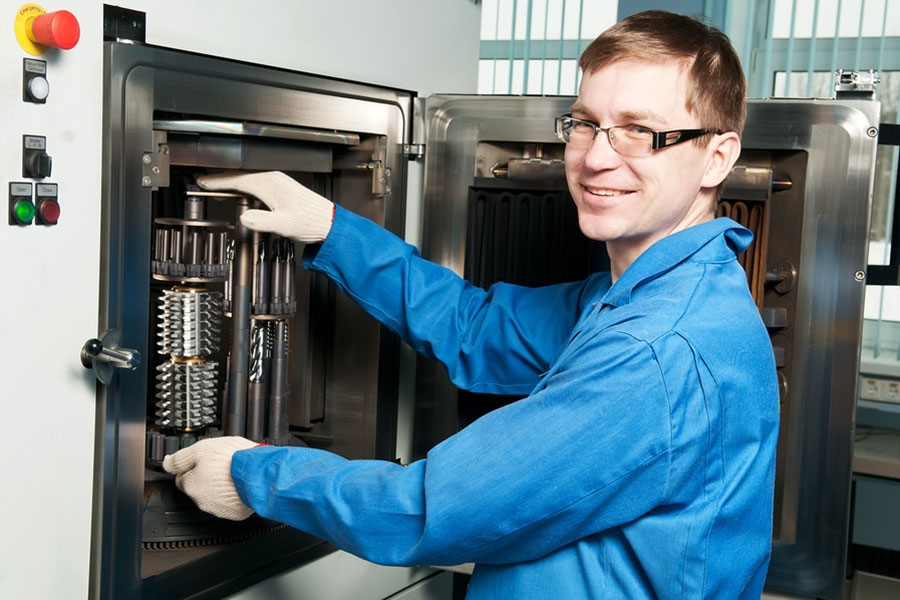For people in their employment years, having a good job goes beyond paying bills and sustaining life. It’s clear that job quality is very important to a person’s happiness and well-being. Job satisfaction leads to employee loyalty, engagement and retention. Said Confucius, “Choose a job you love, and you will never have to work a day in your life.” Being a career tool and die machinist is a desirable job field that can offer satisfying and rewarding employment.
What Do Machinists Do?
Career machinist fields include the roles of machinist, tool maker and die maker.
Machinists use various machine tools including milling machines, lathes and grinders to produce or repair precision metal parts. Some modern processes use lasers, water jets, electrical discharge machines (EDM) and electrified wires in the production process. Machines can be manual, automatic or computer-numeric controlled (CNC) machines. Functions include setting up and operating the machines, aligning, securing and adjusting the cutting tools and working parts of the machinery. Also, finishing, examining and testing completed parts. Machinists work from blueprints, sketches, computer-aided design or manufacturing files.
Tool makers create precision tools that are used to produce items including tools that cut, shape or form metal.
Die makers create metal forms or dies that are used in stamping and forging operations to shape metal, as well as for die casting and molding materials.
Tool and Die makers, as do machinists, work from blueprints, sketches, computer-assisted design or manufacturing files to make tools and dies. They also operate the same types of machinery.
The Career Path of a Tool and Die Machinist
A person can become a career machinist through an apprenticeship program, vocational school, community or technical college, or via on the job experience. Progression to a career includes:
- A high school diploma or its equivalent. During high school years, students should become proficient in math courses, specifically geometry and trigonometry. If available, courses should be taken in blueprint reading, drafting and metal working.
- Advanced education. Some community colleges and technical schools have 2-year programs focused on becoming machinists. Programs will include design courses, blueprint reading, use of welding and cutting tools and the operation of computer-numerically controlled machines. Basic computer skills are essential before entering any type of training program.
- Apprenticeship programs. This can include paid shop training and technical instruction lasting several years, or apprenticeship classes taught in community vocational or technical schools.
- State apprenticeship boards and colleges offer certification programs to standardize the skill levels of machinists. Most employers recognize and value this certification and it often enhances career opportunities.
- On-the-job training which can last a year or longer.
A career machinist should acquire and develop the following qualities:
- Math and computer skills
- Analytical skills
- Manual dexterity
- Mechanical skills
- Physical stamina
- Technical skills
The Job Outlook for Machinists
Employment for machinists is projected to grow at a steady pace for the next six years. With increasing technology applications in many industries, machinists will continue to be in demand to set-up, operate and maintain tool, die and machining systems.
Jobs are projected to be available including the following industries:
- Transportation
- Aerospace
- Automotive
- Defense
- Agriculture
- Electronics
- Telecommunications
How to Advance a Machinist Career
Here are some tips for career machinist advancement:
- Be persistent in seeking the job and company that you desire.
- Be patient in your work. Deliver quality always.
- Strong effort pays off, so work hard.
- Never stop learning.
Find Proven Metal Stamping Expertise at Velocity Metalworks
Velocity Metalworks, serving the Greater St. Louis area and the Midwest has been recognized as a valuable partner in the metal stamping industry for our strong tool design and build competency. With our metal stamping capacity, precision machining services and EDM capability, we provide the superior experience precision and quality manufacturers can count on. Visit our careers page to see any available openings.

